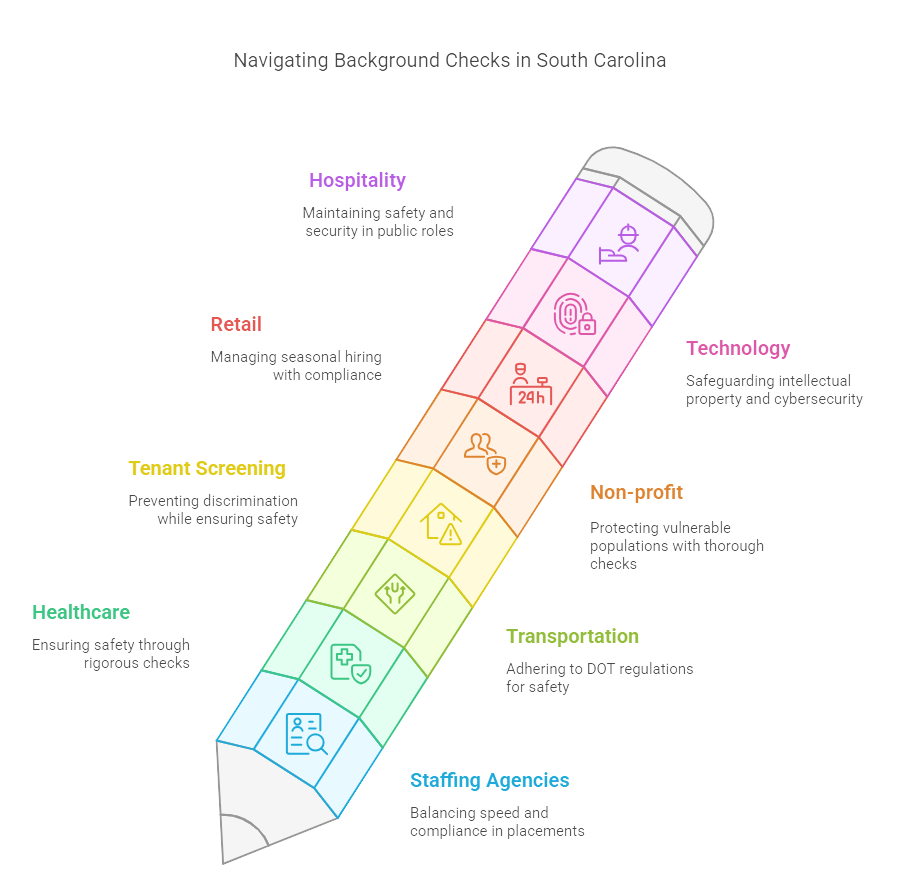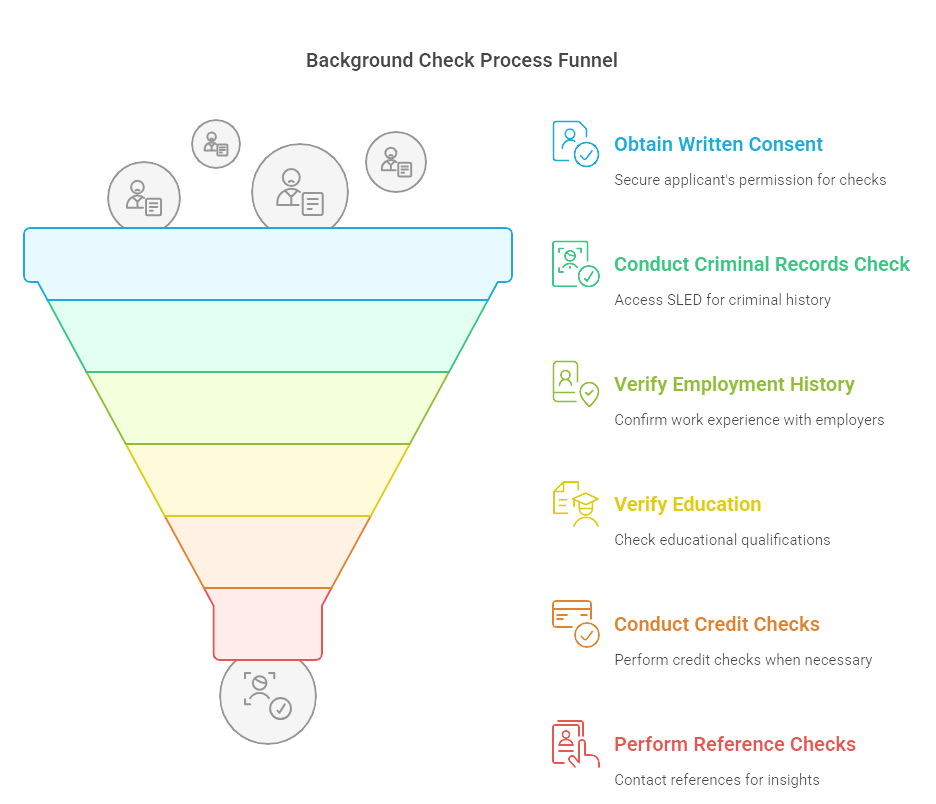Digging into someone’s past while hiring isn’t just about being thorough—it’s about staying on the right side of the law, especially in South Carolina, where specific background check laws are in play. Let’s break down what HR departments, business owners, and recruiters in various industries must be keenly aware of to stay compliant and effective in their hiring processes.
Key Takeaways
- Understanding South Carolina’s background check laws is crucial for avoiding legal pitfalls and ensuring compliant hiring practices across various industries.
- Federal laws such as the Fair Credit Reporting Act (FCRA) and the Equal Employment Opportunity Commission (EEOC) guidelines form the baseline for background checks, emphasizing transparency and non-discrimination.
- State-specific regulations, including the South Carolina State Criminal Records Act and rules regarding the use of credit reports, add a layer of complexity to the background check process.
- Different sectors, such as Healthcare, Transportation, and Retail, have unique requirements and legal considerations for conducting background checks.
- Utilizing accredited Consumer Reporting Agencies (CRAs) and maintaining meticulous records are essential for ensuring compliance and making informed hiring decisions.
Introduction
Hiring the right people is a game-changer for any business, but the stakes, especially legal ones, are high. In South Carolina, background check laws set unique parameters that companies must navigate to avoid hefty fines or lawsuits. This article is a no-nonsense guide to demystifying these regulations, making them practical for everyday application.
So, who’s this for? You've hit the jackpot if you’re a business owner, HR pro, or recruiter in sectors like Healthcare, Transportation, Retail, or Technology. This guide will help you legally and ethically check all the right boxes. Understanding South Carolina's background check landscape can save you from potential legal pitfalls and enable smoother hiring processes in a fast-paced staffing agency or a local non-profit. Let's cut through the clutter and dive straight into what you need to know.
EXPERT INSIGHT: As an HR professional, I feel strongly that performing background checks is less about compliance—and more about striking a balance between trust and accountability with every hiring decision. Each background check is a human experience, full of nuance and redemption and transformation. In South Carolina, where there is statutory additional degrees of caution, we have to remember that as we safeguard our businesses, we're working with peoples' lives. The real power of background screening is in striking the balance between legal rigor and compassion—in still providing safety and integrity knowing that what's happened in someone's history doesn’t necessarily decide what they can be today. - Charm Paz, CHRP
Quick Overview
South Carolina’s background check laws aren’t a walk in the park, but understanding them can make your life much easier. The state has its rules on top of federal laws, which means you’ve got a bit more paperwork to wade through. Knowing these specifics helps you stay compliant and make fair hiring decisions. This guide will break it down so you know what to look for and how to keep on the right side of the law.
The Audience
This guide is tailored for diverse professionals who all share a common need for thorough and compliant hiring practices. Understanding South Carolina’s background check laws can significantly affect your hiring process, whether you're a small business owner or a seasoned HR manager. Recruiters will find this invaluable for identifying suitable candidates while safeguarding company interests.
Staffing agencies must balance the need for speed with strict adherence to legal norms. In healthcare, where patient safety and trust are paramount, stringent checks are recommended and often mandated. Transportation sectors must align with state and federal regulations to ensure public safety. Knowing the legal landscape helps in making informed decisions about tenant screenings.
Non-profits often handle vulnerable populations and must be meticulous with background checks to uphold safety and trust. Retail industries will benefit, especially during seasonal hiring rushes, ensuring they stay compliant despite high turnover. In technology, protecting intellectual property and mitigating cybersecurity risks are critical reasons for a thorough vetting process. Lastly, hospitality industries have unique safety and public interaction needs, making meticulous screening crucial for maintaining a secure environment.
This guide aims to provide these groups with the insights needed to navigate the complexities of South Carolina’s background check regulations, ensuring legal compliance and efficient hiring practices.
The Legal Landscape of South Carolina Background Checks
Navigating the legal landscape of background checks in South Carolina is not just an exercise in due diligence; it's a vital aspect of compliant and responsible hiring. Here’s a closer look at the key federal and state laws that shape how these background checks should be conducted.
Federal Laws That Apply
- FCRA Compliance: The Fair Credit Reporting Act (FCRA) is the cornerstone of background check practices nationwide, including in South Carolina. Under FCRA, employers must obtain written consent from applicants before conducting a background check. They must also disclose if the information obtained will influence employment decisions. Learn more about FCRA Compliance
- EEOC Guidelines: The Equal Employment Opportunity Commission (EEOC) provides guidelines to ensure that background checks do not result in discriminatory practices. Employers must ensure that their screening processes are consistently applied to all candidates and not disproportionately exclude individuals based on race, color, national origin, sex, or religion. Check out the official EEOC background check guidelines.
State-Specific Regulations
- South Carolina’s State Criminal Records Act: This state law administers how criminal records are maintained and shared. Employers must work with authorized agencies like the South Carolina Law Enforcement Division (SLED) to access accurate, up-to-date criminal records.
- Use of Credit Reports: South Carolina law requires employers to meet specific criteria when using credit reports for employment purposes. This includes ensuring that the credit information is relevant to the job and gaining explicit consent from the applicant.
Key Points for Different Industries
The approach varies across different sectors when navigating background checks due to specific legal requirements and operational nuances. Here’s a breakdown that highlights the critical aspects of various industries operating in South Carolina:
Staffing Agencies
Quick yet compliant background checks are paramount. With the high volume of placements in various fields, staffing agencies must balance speed and thoroughness. Staying updated with the ever-changing compliance landscape ensures they efficiently meet client and legal expectations.
Healthcare
This sector demands heightened scrutiny. Legally required checks may include abuse registries, professional licensure verification, and extensive criminal records to safeguard vulnerable populations. Compliance with federal and state healthcare-specific regulations is non-negotiable to maintain trust and safety.
Transportation
Adherence to state and federal Department of Transportation (DOT) regulations is necessary. Regular checks, including driving records and substance abuse testing, are central to remaining compliant and ensuring safe operations. Monitoring updates to DOT requirements is crucial to maintain standards.
Tenant Screening
Understanding the interplay between state tenant laws and employment screening processes can be complex for those involved in tenant screening. Rigorous criminal and credit checks help ensure safe and reliable tenancy while staying within the legal framework to prevent discrimination while performing applicant assessments.
Non-profit
Non-profits are often subject to more stringent background checks due to their work with vulnerable populations such as children, the elderly, or individuals with disabilities. Thorough background screening procedures are recommended and often legally mandated to ensure safety and reliability in service delivery.
Retail
With seasonal hiring surges, background checks must be swift and compliant. Retailers must stay vigilant during these high-volume periods, ensuring that temporary hires meet the same standards as permanent employees. Focus on theft prevention and customer safety remains a priority.
Technology
Intellectual property and cybersecurity risk assessments are critical. Tech companies must verify the integrity and reliability of their employees to protect sensitive information. Background checks may concentrate on criminal records, previous employment verification, and sometimes even social media scrutiny.
Hospitality
Safety and security compliance are paramount, especially for high public interaction roles. Ensuring employees have clean records fosters a secure environment for guests and staff. Background checks focusing on criminal history and sometimes credit checks for financial roles can be vital.
By understanding these tailored requirements, HR professionals in South Carolina can execute effective and compliant background checks, fostering safe and efficient workplace practices across diverse sectors.

Steps for Conducting Background Checks in South Carolina
Preliminary Considerations
Before diving into the background check process, HR departments must clearly define which aspects are vital for their specific industry and the roles they are filling. Not every job will require a comprehensive background check, so it's crucial to tailor the scope to the position. For instance, jobs in healthcare may necessitate abuse registry checks, whereas finance roles might require credit history reviews.
The next critical step is gaining written consent from the applicants. Obtaining explicit permission is non-negotiable under both the Fair Credit Reporting Act (FCRA) and South Carolina state laws. This consent must be clear and cannot be hidden within other application materials—it's best practice to have a standalone document for this purpose.
Understanding these preliminary considerations sets the foundation for a lawful, efficient, and ethical hiring process. They are the bedrock for conducting thorough and compliant background checks in South Carolina.
The Screening Process
Criminal Records
Access South Carolina criminal records through the South Carolina Law Enforcement Division (SLED). This will provide you with a comprehensive statewide overview of any criminal history. Ensure you follow all legal requirements for accessing and using this information, and remember to inform candidates about which records you will be checking.
Employment History Verification
Cross-checking previous employment is crucial for verifying a candidate’s work experience and reliability. Contact former employers to confirm job titles, dates of employment, and reasons for leaving. This helps you ensure the candidate's information is accurate and may also offer insights into their work ethic and compatibility with your company culture.
Education Verification
Confirm the educational qualifications claimed by the candidate. Contact educational institutions to verify degrees, certifications, and other credentials. This step is particularly essential for roles that require specific expertise or qualifications.
Credit Checks
Conduct credit checks only when necessary, such as positions dealing with financial transactions or sensitive information. Compliance with state and federal laws is mandatory—ensure you meet the conditions set out by the Fair Credit Reporting Act (FCRA) and any specific South Carolina legislation. Obtain the candidate’s written consent before conducting a credit check.
Reference Checks
Contact professional references provided by the candidate to get a broader sense of their skills, work habits, and suitability for the role. These conversations can reveal strengths and potential areas of concern that may not surface during interviews or other checks. Aim for a balanced view by speaking to multiple references whenever possible.
Utilizing Third-Party Services
Engage accredited Consumer Reporting Agencies (CRAs) that thoroughly understand South Carolina’s specific legal requirements. These agencies can provide a more efficient and legally compliant screening process. Ensure the CRA is reputable and in good standing with organizations like the Professional Background Screening Association (PBSA).

Compliance and Best Practices
Adverse Action Process
If you're considering taking adverse action—like not hiring someone based on background check results—adhere to the Fair Credit Reporting Act (FCRA) guidelines. First, provide the applicant with a pre-adverse action notice and a copy of the background check report. This gives them a chance to dispute the information. If the initial decision stands, send a formal adverse action notice. It's not just about compliance; it's about giving candidates a fair shot.
Record Keeping
Don't get sloppy with your documentation. Keeping meticulous records of all background checks is non-negotiable. This includes consent forms, screening results, and communicating with candidates about their background checks. Good records can save you a lot of headaches if any disputes or audits arise.
Ban the Box
While South Carolina doesn’t have a statewide "Ban the Box" law, some local jurisdictions might. This means you could still face "Ban the Box" regulations depending on where your business operates within the state. Always double-check local laws to stay on the safe side. Ignorance is no excuse for non-compliance.
Adopting these best practices ensures that your hiring process stands up to scrutiny and embodies fairness and transparency. Not only do you stay compliant, but you also build a positive reputation as an employer who values fairness and integrity in the hiring process.
Frequently Asked Questions
Does South Carolina have background checks?
Yes, South Carolina requires background checks for employment, gun purchases, and certain types of licenses. These checks typically include reviewing criminal records, credit reports, and sometimes educational and employment histories.
What is a Level 2 background check in SC?
A Level 2 background check in South Carolina includes a fingerprint-based search of state and national databases, focusing on disqualifying offenses such as violent crimes and drug trafficking. It is often used for positions of trust, including childcare and elder care.
Are South Carolina criminal records public?
Yes, South Carolina criminal records are generally public and can be accessed through the South Carolina Law Enforcement Division (SLED). However, some documents may be sealed or expunged, making them inaccessible.
How much does a background check cost in South Carolina?
The cost of a background check in South Carolina can vary. For example, a basic name-based check through SLED costs around $25. Additional fees may apply for more comprehensive checks or for using third-party services.
Is South Carolina an open records state?
Yes, South Carolina is considered an open records state under the South Carolina Freedom of Information Act (FOIA). This law grants the public access to government records, excluding certain confidential and exempted information.
How do I check if I have a warrant in SC?
To check if you have an outstanding warrant in South Carolina, you can contact the local county sheriff's office or use online resources provided by the South Carolina Judicial Department. Some third-party websites may also offer warrant search services.
Who can see sealed records in South Carolina?
In South Carolina, sealed records are generally not accessible to the public. They can only be viewed by certain authorized entities, such as law enforcement agencies, the court system, and sometimes prospective employers with specific authorization.
How far back do South Carolina background checks go?
South Carolina background checks typically cover up to 7-10 years of an individual's criminal history, depending on the type of check and the requesting entity. For certain positions, especially those involving children or the elderly, checks might extend further back.
How to get a background check in SC?
To get a background check in South Carolina, you can request one through the South Carolina Law Enforcement Division (SLED) via their website or by mail. You'll need to provide specific personal information and pay the applicable fee. Third-party services may also conduct background checks for a fee.
Conclusion
Compliance with South Carolina’s background check laws is pivotal for HR departments and business owners across various industries. Being informed, diligent, and transparent during your hiring process ensures legal compliance and creates a safer and more trustworthy work environment for everyone involved. Remember to keep abreast of state-specific regulations and broader federal guidelines to maintain robust employment screening practices.

GCheck Editorial Team
Meet the GCheck Editorial Team, your trusted source for insightful and up-to-date information in the world of employment background checks. Committed to delivering the latest trends, best practices, and industry insights, our team is dedicated to keeping you informed.
With a passion for ensuring accuracy, compliance, and efficiency in background screening, we are your go-to experts in the field. Stay tuned for our comprehensive articles, guides, and analysis, designed to empower businesses and individuals with the knowledge they need to make informed decisions.
At GCheck, we're here to guide you through the complexities of background checks, every step of the way.






